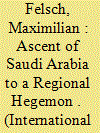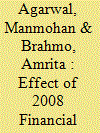| Srl | Item |
| 1 |
ID:
173974


|
|
|
|
|
| Summary/Abstract |
After the Arab upheavals that began in 2011, Saudi Arabia became the most dominant power in the Arab world. While most of its Arab rivals experienced political and economic crises and disintegration, the Gulf monarchy began an unprecedented active and even interventionist foreign policy and increased its regional influence tremendously. Remarkably, most of this activism was not exercised unilaterally but within regional institutional frameworks, mainly of the League of Arab States (LAS) and the Gulf Cooperation Council (GCC). This article investigates how Saudi Arabia gained institutional power within the LAS. The analysis is based on the LAS decisions at the Summit level before and after the Arab uprisings with regard to Saudi Arabia’s main foreign policy interests. The purpose of the article is to examine the essence of Saudi Arabia’s regional power. It also looks at the unforeseen revitalization of the LAS and allows predictions of the future of Arab regionalism in a changing Arab world.
|
|
|
|
|
|
|
|
|
|
|
|
|
|
|
|
| 2 |
ID:
173973


|
|
|
|
|
| Summary/Abstract |
Violence seems on the rise. After centuries of declining homicide rates in the Global North, violence has been transforming since the 1960s and even increased in some parts. In the Global South, in contrast, levels of violence have remained constantly high. The article questions both the liberal peace theory lately highlighted by Steven Pinker as well as Marxist accounts on the relationship between capitalism and increasing violence, lately dubbed accumulation by dispossession. This article elaborates a heterodox Keynesian model of capitalist growth in which growth ultimately depends on rising real wages. Following this Kaleckian model of capitalism, money plays a pivotal role regarding the low propensity for violence in capitalist societies: capitalist credit money tends to alter the matter of dispute from non-divisible to divisible and thus functions as a general denominator for social conflicts. Conflicts in capitalism are about ‘more or less’ instead of ‘either/or’. In the Global South, in contrast, capitalism is too weak to structure the economic sphere as economic rents predominate. Rents tend to favour social closure and social verticalization. They are particularly prone to violence. Inasmuch as economic rents penetrate capitalist societies, violence will be increasing in the Global North as well.
|
|
|
|
|
|
|
|
|
|
|
|
|
|
|
|
| 3 |
ID:
173972


|
|
|
|
|
| Summary/Abstract |
There has been considerable debate over whether the USA is losing its stronghold over the world economy and its power declining, giving way to new leadership from the emerging economies (EEs) like China. This article uses the notion of power based on the resources available to a state. It uses a number of measures to measure the resources available to a state and so assess economic power. It finds that there has been a slight decline in the importance of the developed countries and an increase in that of the developing countries (DCs). However, there is a slight decline in the power of the USA. The increase in the importance of developing countries is mainly on account of China. But the changes do not mean that developing countries can get the changes they desire. There is more of a stalemate.
|
|
|
|
|
|
|
|
|
|
|
|
|
|
|
|
| 4 |
ID:
173975


|
|
|
|
|
| Summary/Abstract |
Political developments, such as the ‘Arab Spring’, have led the Middle East and North Africa (MENA) towards instability, unrest and severe sectarian confrontations. Nearly 2 years before the ‘Arab Spring’, ‘the Iranian Green Movement’ swept over the country and led to the expectations that Iran would undergo a fundamental political change. The article addresses an important question as to why the 2009 Iranian unrest known as the ‘Green Movement’ did not lead to regime change, while on the other hand, the ‘Arab Spring’ ultimately led to the change of political systems in Tunisia and Egypt. Further, some significant factors are highlighted anticipating the degree of stability and instability for the future of political regimes in the MENA region.
|
|
|
|
|
|
|
|
|
|
|
|
|
|
|
|
| 5 |
ID:
173976


|
|
|
|
|
| Summary/Abstract |
Energy transition has been gaining significant policy attention in India, especially in the backdrop of the concerns about growing emissions from fossil fuels and the need for cleaner energy services. However, this has been one of the strategic dilemmas for the country. On the one hand, the increasing demand for fossil fuels is prompting critical policy actions to minimize the energy-related emissions and reduce the dependency on the same. On the other hand, the national economic targets that demand high growth have been pivotal in pushing the energy demand growth and have also been unable to shift away from the conventional energy mix.
|
|
|
|
|
|
|
|
|
|
|
|
|
|
|
|